#paytm payment
Explore tagged Tumblr posts
Text
Paytm prioritizing consumer payments business: CEO

A senior company official stated on Sunday that Paytm, a fintech company, is prioritizing investments in its consumer payments division in an attempt to regain lost users as a result of RBI regulatory steps.
Paytm Payments Bank was not allowed to take deposits or process credit transactions in consumer accounts, including prepaid instruments and wallets, according to the RBI.
For Rs 2,048 crore, Paytm sold its ticketing division to foodtech company Zomato in August in order to concentrate more on its main business of distributing financial services and making payments. Read More -- https://voiceofentrepreneur.life/
1 note
·
View note
Text
India's Paytm's payments services arm receives government approval
BENGALURU — India’s Paytm (PAYT.NS), opens new tab has received an approval from the finance ministry to invest in its payment services business, the fintech firm said on Wednesday. One 97 Communications, popularly known as Paytm, has been under the scrutiny of India’s banking regulator and financial crime-fighting agency after the central bank ordered it to wind down its payments bank in…
0 notes
Text
The Paytm Fallout

Since its inception in 2010, Paytm has been a groundbreaker in India's fintech industry, revolutionizing digital payments and e-commerce with its innovative platform. The 2016 demonetization drive significantly accelerated its growth. By 2017, Paytm took a major leap by launching Paytm Payments Bank, aiming to integrate digital wallet convenience with traditional banking services and enhance financial inclusion for millions. However, by early 2024, Paytm Payments Bank faced a dramatic downfall.
In this post, we will dissect the factors behind the collapse of Paytm Payments Bank and offer insights into maintaining compliance in the dynamic digital finance sector.
Analyzing the Factors Behind Paytm Payments Bank’s Collapse
Paytm Payments Bank's challenges began emerging in 2016 with a lawsuit filed by PayPal at the Indian Trademark Office. PayPal accused Paytm of mimicking its logo’s color scheme and design, which significantly impacted Paytm’s reputation and revealed its lax approach towards intellectual property.
The situation further deteriorated in 2018 when an undercover video surfaced, capturing a conversation between a journalist and Paytm’s Vice President. The video alleged that Paytm was compromising user privacy by sharing private data with the Indian government. This controversy was exacerbated by claims that Ajay Shekhar Sharma, the Vice President's brother, had close ties with the ruling political party. Despite Paytm's public denials and assurances of no data sharing with third parties, the damage to its image was considerable.
The most severe blow came in 2020 when Google temporarily delisted the Paytm app from the Play Store due to violations of its gambling policies. This incident drew significant regulatory attention, exposing concerns about Paytm's oversight of financial transactions and regulatory compliance. The app’s removal underscored vulnerabilities in Paytm’s data management and security practices.
Further scrutiny revealed that Paytm Payments Bank had shared user data with Chinese entities that had indirect stakes in the company. This raised serious concerns for the Reserve Bank of India (RBI), leading to a directive in March 2022 that prohibited Paytm Payments Bank from acquiring new customers due to lapses in data security and management practices.
The final blow was delivered in January 2023 when the RBI mandated the closure of Paytm Payments Bank by February 2024. This decision resulted from findings that Paytm Payments Bank had failed to conduct proper due diligence on the sources of funds during customer onboarding, marking a severe compliance breach that further eroded investor and stakeholder confidence.
Government and Regulatory Responses
In reaction to these events, the Indian government and the RBI implemented stricter regulations. The RBI introduced enhanced measures for data privacy and security for digital payment platforms, requiring rigorous background checks before onboarding clients.
Additionally, the government imposed stricter regulations on foreign investments in Indian fintech, particularly from countries deemed security risks, to safeguard national interests and user data.
The RBI also mandated regular audits for digital payment companies, enabling prompt corrective actions to address any lapses in data security or financial management.
Maintaining Compliance in the Fintech Industry
For fintech companies, adherence to regulatory requirements is essential to maintaining trust and avoiding legal issues.
Essential Compliance Strategies Include
Strong Data Privacy Policies: Develop and enforce comprehensive data protection policies to ensure compliance with applicable regulations and safeguard user information.
Regular Audits and Compliance Checks: Perform consistent audits to verify proper financial management and adherence to security standards.
Staying Updated on Regulations: Keep abreast of evolving regulatory requirements and adjust practices accordingly to prevent legal complications and foster trust with clients and stakeholders.
The downfall of Paytm Payments Bank serves as a critical lesson for the fintech sector, highlighting the importance of rigorous compliance and the potential risks of neglecting data security. By learning from Paytm's experience, other companies can take proactive steps to ensure compliance and avoid similar pitfalls.
Compliance is not merely about following regulations; it’s about building a robust and trustworthy business that thrives within a regulated framework.
JJ Tax: Your Partner in Compliance
At JJ Tax, we specialize in managing the complexities of tax and regulatory compliance, allowing you to focus on growing your business. Let us handle your compliance needs, ensuring your company remains secure, compliant, and positioned for long-term success.
JJ Tax
1 note
·
View note
Text
Paytm Faces SEBI's Scrutiny Over Related Party Transactions with PPBL in FY22
Introduction
In a recent development, One 97 Communications, the parent company of Paytm, has received an administrative warning from the Securities and Exchange Board of India (SEBI). The issue revolves around related party transactions conducted with Paytm Payments Bank (PPBL) during the fiscal year 2022, which lacked the necessary approvals from the audit committee and shareholders.

SEBI’s Examination and Findings
According to a letter from SEBI dated July 15, an examination was conducted regarding the disclosure of financial and other information by One 97 Communications and its associate, PPBL. The examination revealed non-compliances related to related party transactions (RPTs) between the company, its subsidiaries, and PPBL.
The SEBI letter highlighted that the company had engaged in excess RPTs with PPBL, amounting to Rs 324 crore for availing services from PPBL and Rs 36 crore for rendering services to PPBL, all without due approval. Despite the company’s claim that these transactions were communicated to shareholders, SEBI found that they should have been categorized as material RPTs and approved accordingly.
Company’s Response
In response to the findings, One 97 Communications reiterated its commitment to compliance with SEBI regulations. The company emphasized its dedication to upholding the highest compliance standards and stated that it would submit a detailed response to SEBI. The fintech firm assured that it has consistently acted in line with SEBI’s guidelines.
SEBI’s Warning and Recommendations
SEBI has taken the violations seriously, issuing a stern warning to Paytm. The regulatory body advised the company to enhance its compliance standards to prevent future occurrences of such non-compliances. SEBI also instructed the company to present its letter before the board in its upcoming meeting for information and necessary corrective actions. A report on the actions taken is to be submitted to SEBI within ten days of the board meeting.
Conclusion
This administrative warning serves as a crucial reminder for companies to maintain rigorous compliance with regulatory standards. Paytm’s commitment to rectifying these issues and demonstrating the highest compliance standards will be closely monitored by SEBI and stakeholders alike.
0 notes
Text
Securities and Exchange Board of India (SEBI) has sounded an alarm for Paytm, India's leading digital payments giant, over two unapproved transactions with its subsidiary, Paytm Payments Bank. The transactions, totaling over $42 million, have raised concerns within the regulatory body.
#paytm#paytmcash#paytm news#paytm payments bank#sebi news#sebi registered investment advisor#indian news#breaking news#news#finance#world news#lawsuit#banking
1 note
·
View note
Text
Integrate Our UPI Collection API
Integrating the UPI Collection API by Rainet Technology Private Limited into your financial infrastructure offers a seamless and efficient way to manage digital transactions. The UPI API, or Unified Payments Interface API, is designed to facilitate instant payment processing, making it an indispensable tool for businesses seeking to enhance their financial operations. By leveraging the UPI Collection API, businesses can streamline their payment collection processes, reducing the time and effort required to manage transactions manually. This integration not only improves the speed of transactions but also enhances security, ensuring that all payments are processed through a secure and reliable platform.
The UPI Collection API integration process is straightforward, allowing businesses to quickly implement the technology without significant disruption to their existing systems. Rainet Technology Private Limited provides comprehensive support and documentation to guide businesses through each step of the integration process. This ensures that even businesses with limited technical expertise can successfully adopt the UPI Collection API and begin reaping its benefits almost immediately.
One of the key advantages of integrating the UPI Collection API is the ability to offer customers a convenient and flexible payment option. With the UPI API, customers can make payments directly from their bank accounts using their smartphones, eliminating the need for cash or card transactions. This not only enhances the customer experience but also reduces the risk of payment fraud and errors.
Moreover, the UPI Collection API integration can significantly boost operational efficiency. Automated transaction processing reduces the need for manual intervention, freeing up staff to focus on more strategic tasks. This leads to improved productivity and cost savings for the business. In summary, integrating the UPI Collection API by Rainet Technology Private Limited is a strategic move for any business looking to enhance its payment processing capabilities, improve security, and offer a superior customer experience.
Visit Website: https://rainet.co.in/upi-collection-api.php
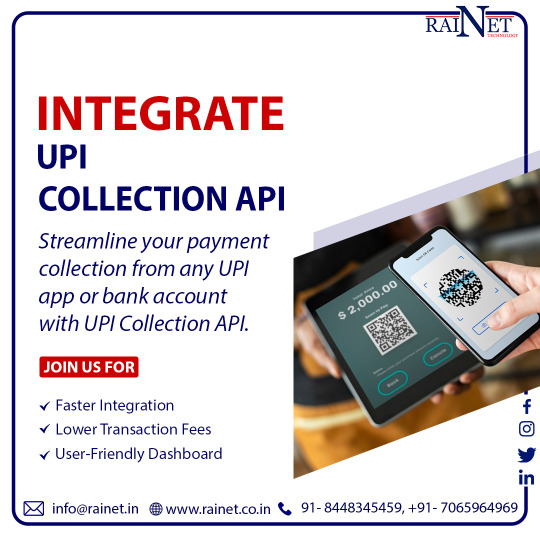


#upi integration api#upi api integration#upi payment gateway#paytm upi integration api#upi integration#upi payment gateway integratio#bbps api provider#upi payment gateway integration#education portal development company#bbps#bbps login
0 notes
Text
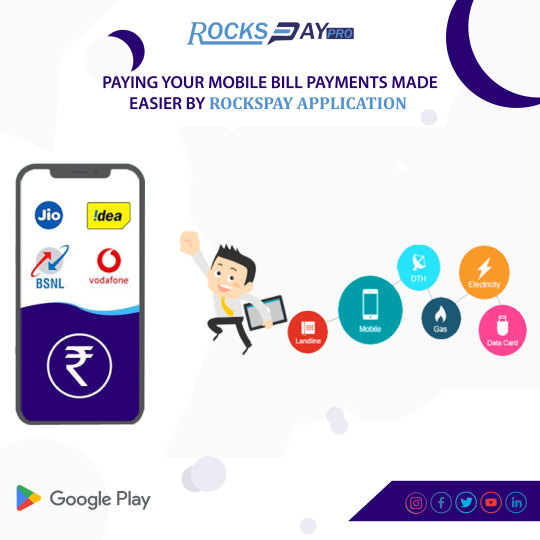
The customer has different utility payments like Electricity Bill payment, Mobile bill payments, Water bill payments, insurance payments, etc.
#onlinepayment#onlineshopping#digitalpayment#payment#payments#paymentgateway#onlineshop#instagram#fashion#paymentsolutions#pulsa#ecommerce#onlinepayments#shopping#bestquality#indosat#online#dompetdigital#uangelektronik#india#paytm#mobilemoney#rockspay
0 notes
Text
Paytm gets five handles to continue UPI transactions, existing one to continue
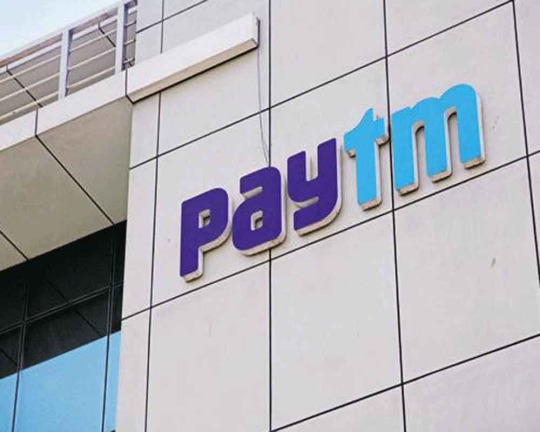
Fintech firm One97 Communications, owner of the Paytm brand, has got five handles in partnership with four banks to continue UPI transactions, as per an update on the NPCI website.
The company's existing handle @paytm is among the five handles that users can continue using without the need to make any changes at their end.
National Payments Corporation of India (NPCI) has approved @paytm and a closed user group UPI handle @ptyes for Paytm in partnership with Yes Bank.
NPCI has also approved @pthdfc with HDFC bank and @ptsbi with State Bank of India as a partner. However, these two handles are not active immediately.
Paytm spokesperson said users can continue to use @paytm handle seamlessly without the need to make any changes at their end.
On March 14, NPCI approved a third party application (TPAP) provider permit for Paytm in collaboration with SBI, Axis Bank, Yes Bank and HDFC bank for continuity of UPI transactions for the company's users.
Paytm's UPI transactions were earlier being carried out through Paytm Payments Bank (PPBL) that has been barred by the Reserve Bank of India from accepting deposits, credit transactions, or top-ups in any customer accounts after March 15.
One97 Communications Limited (OCL) holds a 49 per cent stake in PPBL, while company's Founder and CEO Vijay Shekhar Sharma holds 51 per cent stake in the beleaguered bank.
Source : Paytm gets five handles to continue UPI transactions, existing one to continue
1 note
·
View note
Text
youtube
The Rise of UPI and the Apps fueling this growth story...
0 notes
Text
What Does Vijay Shekhar Sharma's Resignation Mean for Paytm Payments Bank?
Vijay Shekhar Sharma has stepped down as part-time non-executive Chairman of Paytm Payments Bank Limited (PPBL), and the board of the bank has been reconstituted.
As one of India’s most prominent entrepreneurs, Vijay Shekhar Sharma has been at the helm of Paytm Payments Bank since its inception. However, with his recent resignation announcement, many are left wondering what this shift in leadership means for the future of this fintech giant. In this blog post, we delve into the implications of Sharma’s departure and explore how it may impact the trajectory…

View On WordPress
#anomalies&039;#FUNDING#PAYTM#Paytm Payments Bank Limited#PPBL#RBI#REGULATIONS#resignation#Vijay Shekhar Sharma#VSS
0 notes
Text
Unraveling the Paytm Crisis: Implications for India's Finance and Fintech Sector
The recent imposition of limitations on Paytm Payments Bank by the Reserve Bank of India (RBI) has sent shockwaves through the fintech sector, prompting reflections on its potential impact. This crisis underscores the importance for all fintech players to prioritize regulatory adherence, with potential outcomes and lessons for finance professionals and industry participants. Key…

View On WordPress
#Fintech Sector#Indian Economy#Paytm#Paytm Crisis#Paytm Implications#Paytm news#Paytm Payment Bank#Paytm Wallet
0 notes
Text
Paytm Payment Bank:पेटीएम नियामक अनुपालन के खिलाफ आरबीआई की कार्यवाही
RBI Proceedings Against Paytm Bank Regulatory Compliances The recent action of the Reserve Bank of India (“RBI”) against Paytm’s subsidiary, the Paytm Payment Bank has sent ripples across the fintech industry. The payment bank has been barred by RBI from engaging in any further activities that involve accepting deposits or top-ups in any customer account, prepaid instruments, FASTags, wallets,…

View On WordPress
0 notes
Text
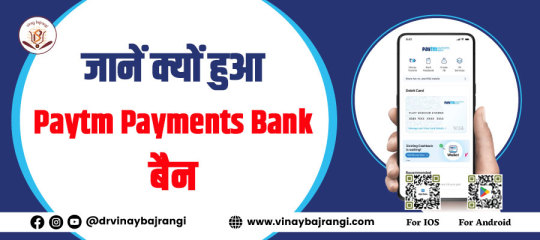
ऐसा ही Paytm IPO को लॉन्च करते वक्त व��जय शर्मा ने गलती की थी। जब Paytm IPO को लॉन्च किया गया था तब दिनांक 08 नोवेंबर और साल 2021 था। तब केतु की दशा व शनि का अंतर्दशा चल रही थी और मूल नक्षत्र का चौथा चरण था। केतु और शनि की युति से धन हानि होता है साथ ही साथ कोर्ट के चक्कर भी लगाने पड सकते है। ज्योतिष कार के अनुसार इन गलतियों के कारण आज यह सब विजय शर्मा को देखना पड रहा हैं।
0 notes
Text
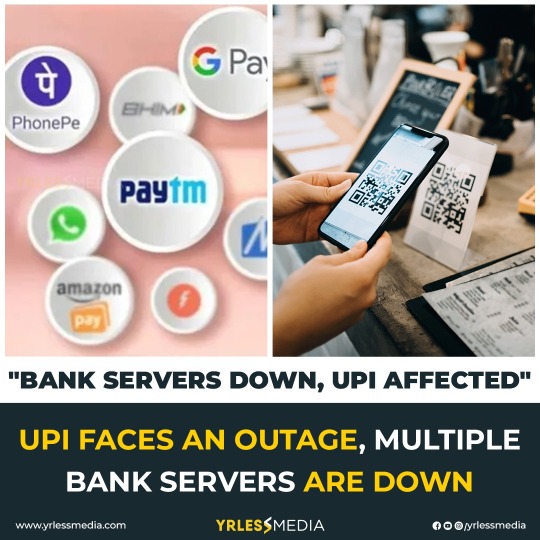
On Tuesday, multiple Unified Payments Interface (UPI) users took to social media to complain about an outage during transactions.
Netizens said making payments through UPI-enabled apps like Google Pay, PhonePe, Paytm, BHIM, etc was getting challenging, which the National Payments Corporation of India (NPCI) said was due to "internal technical issues" at a few banks.
"Regret inconvenience on UPI connectivity as a few banks have some internal technical issues. NPCI systems are working fine and we are working with these banks to ensure a quick resolution," said NPCI on the X platform (formerly Twitter).
X users complained most problems were faced when they tried making UPI payments through their HDFC Bank, State Bank of India, and Bank of Baroda accounts, among other banks.
#upi #downfall #serverbusy #bankservers #paytm #googlepay #phonepay #amazonpay #payments #onlinepayments #money #onlinetransactions #affected #notgettingmoney #hyderabad #yrlessmedia
1 note
·
View note
